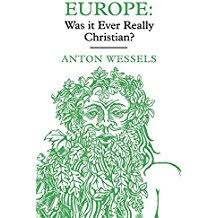 Anton Wessels, a Reformed Christian professor of “missiology”, wrote a book many years ago, Europe: Was It Ever Really Christian? The title reflects on the fact that a secular ‘post-Christian’ Europe may never have been very Christian at all, at least in Wessels’ telling.
Anton Wessels, a Reformed Christian professor of “missiology”, wrote a book many years ago, Europe: Was It Ever Really Christian? The title reflects on the fact that a secular ‘post-Christian’ Europe may never have been very Christian at all, at least in Wessels’ telling.
Wessels writes from a Reformed Protestant perspective. This tradition has taken a very dim view historically of ‘popular folk religion’ during the medieval period in much of Northern Europe. Wessels’ catalog of non-Christian beliefs and practices before and during the Reformation emphasize that from the perspective of a confessing Reformed Protestant it may actually be a fact that most of the population never truly internalized in the gospel, even if they made outward show of affiliation with the Christian religion. Christendom was nominal, not substantive.
There are many arguments one can bring to bear to critique Wessels’ views. In particular, some historians of religion assert that in fact, late medieval piety resulted in the spread of genuine deeply held Christianity to the peasantry of much of Europe. The argument then is that this sincere Christianity is actually one reason that the Reformation occurred when it did. Additionally, even granting Wessels’ contention about the medieval period, the competition between Protestants and Catholics after 1500 guaranteed attention to popular beliefs and practices for several centuries before secularization. The suppression of pagan practices among Lithuanian peasants occurred during the period when Catholic clerics were fighting off the expansion of Protestants.
And yet I think we need to give the nod to some element of Wessels’ thesis: that popular Christianity was quite distinct and different from the faith promulgated from on high, and officially claimed as the ideological basis of Western societies. Perhaps the rise of modern secularism is in some ways the proletarianization of European culture?
What does this have to do with India? In the comments below, and in the media, some Indians are bemoaning the death of secular India. But was India ever secular truly? Nehru was an agnostic. His great-grandchildren now make a show of attending Hindu temples and asserting their Brahmin lineage.
I grew up in the United States of Ameria with the children of elite Indian Americans, who left in the 1960s and 1970s. These people were all urbane, and most of them were not particularly religious. But, like my own parents, they were all very self-conscious of their “communal” identity. These were people who grew up in a “secular India”, and moved through good universities. Because of the times, and when they left, many still retained socialist sympathies (as my own parents do). But, these were not liberal cosmopolitans. Most of their children were absorbed into American culture, but they were products of something very alien to liberal individualism.
The India that people are mourning was a weird chimera. Traditional, collectivist, and communal on the broad level. But ruled by a small English-speaking elite with cosmopolitan pretentions, Macaulay’s children. Generations of secularism and socialist rule did not erode the ancient foundations of Indian society, with caste and community reigning paramount.
What we are seeing is the death of the chimera and the revolt of the middle class. True change and secularization are going to occur only with broad-based prosperity and urbanization. Secular socialist India couldn’t bring that, and so nothing changed on the fundamental structural level. Its failure laid down the seed-bed for the emergence of the Hindu Right, which draws deeply at the well of communal sentiment which is stitched throughout the fabric of Indian society.